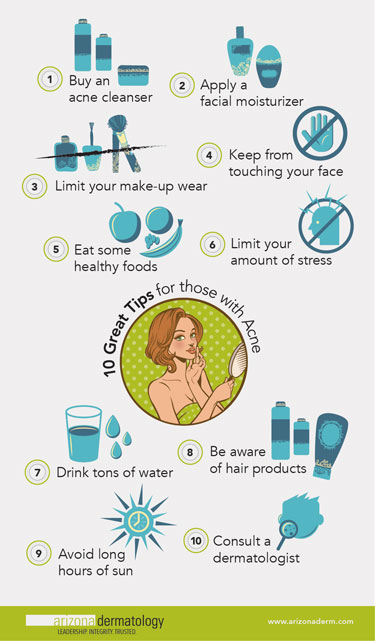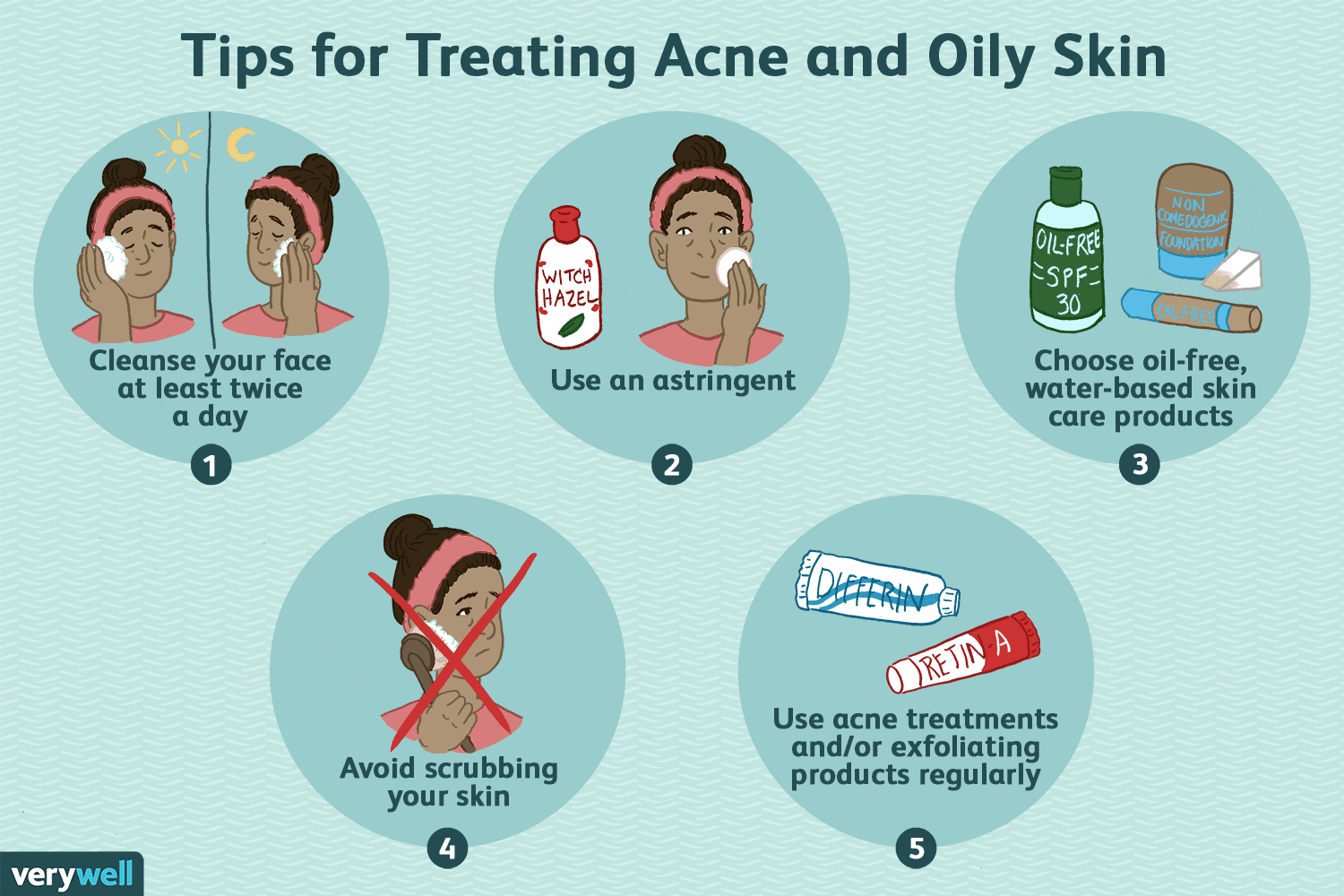To combat acne effectively, maintain a consistent skincare routine and consider dietary changes. Seek professional advice for persistent issues.
Acne, a common skin condition, often results from clogged pores and can cause significant distress. Managing acne involves a holistic approach that includes good hygiene practices, such as washing your face twice daily with a gentle cleanser to remove excess oil and dead skin cells.
It’s also essential to choose non-comedogenic makeup and skincare products that won’t block pores. Diet plays a crucial role in skin health; thus, incorporating foods rich in omega-3 fatty acids and antioxidants while reducing sugar and dairy intake might help improve acne. Remember, touching your face frequently can transfer bacteria and oils from your hands, exacerbating the problem. Should over-the-counter treatments prove ineffective, consulting a dermatologist is a wise step to explore prescription options and personalized advice. With patience and care, it’s possible to achieve clearer skin and boost your confidence.

Credit: arizonaderm.com
The Battle Against Acne: Key Factors
The Battle Against Acne: Key Factors involves understanding the intricacies of your skin and the role your diet plays. Embarking on this journey requires knowledge and the right tactics to emerge victorious. Let’s dive into two crucial aspects of this battle: identifying your skin type and the impact of diet on acne.
Identifying Your Skin Type
To effectively fight acne, knowing your skin type is essential. Different skin types react uniquely to acne treatments and products. The five main skin types are:
- Normal: Balanced moisture with few imperfections
- Oily: Shiny complexion prone to pimples
- Dry: Often flaky with a rough texture
- Combination: Mix of oily and dry areas
- Sensitive: Reacts easily to products and irritants
Identify your skin type by observing how it feels after cleansing. Choose products that match your skin’s needs. This helps prevent aggravation of acne.
How Diet Influences Acne
Your diet can affect your skin’s health. Some foods may trigger breakouts, while others can help clear your skin. Consider these dietary tips:
| Food Types | Effect on Acne |
|---|---|
| High-glycemic foods | May increase blood sugar and worsen acne |
| Dairy products | Some studies link them to acne |
| Omega-3 fatty acids | Can reduce inflammation and improve acne |
| Antioxidant-rich foods | Helps fight free radicals and may reduce breakouts |
Focus on a balanced diet rich in vegetables, fruits, and lean proteins. Stay hydrated and limit processed foods. A healthy diet is a powerful ally in your acne-fighting arsenal.
Cleanse Wisely: Choosing The Right Products
Acne-prone skin requires a thoughtful approach to cleansing. Choosing the right products can mean the difference between irritation and clear skin. A good cleanser removes dirt and oil without stripping the skin. Let’s explore what to look for and what to avoid.
Ingredients To Look For
When selecting a cleanser, key ingredients can help combat acne:
- Salicylic Acid: Unclogs pores and reduces inflammation.
- Benzoyl Peroxide: Kills acne-causing bacteria.
- Glycolic Acid: Exfoliates and reveals fresh skin.
- Sulfur: Dries out blemishes and absorbs excess oil.
- Tea Tree Oil: Offers natural antibacterial properties.
Common Cleansing Mistakes
Avoid these common errors to prevent making acne worse:
| Mistake | Why to Avoid |
|---|---|
| Over-washing | Strips skin of natural oils, leading to more oil production and breakouts. |
| Harsh Scrubbing | Causes irritation and can aggravate acne. |
| Using Hot Water | Hot water can irritate the skin and increase inflammation. |
| Not Rinsing Well | Residue can clog pores and lead to pimples. |
| Ignoring Skin Type | Using products not suited for your skin can worsen acne. |
Exfoliation: The Gentle Path To Renewal
Exfoliation: The Gentle Path to Renewal is a transformative step in any skincare routine. It helps shed dead skin cells and unclog pores, paving the way for a fresher, smoother complexion. For those battling acne, exfoliation can be particularly beneficial, encouraging cell turnover and preventing the buildup that leads to breakouts. Yet, it’s crucial to find the right balance to avoid irritation.
Chemical Vs Physical Exfoliants
Diving into the world of exfoliants reveals two main types: chemical and physical. Chemical exfoliants include acids like AHAs and BHAs that dissolve dead skin cells. They are gentle and suit sensitive skin. Physical exfoliants use small grains or brushes to scrub away dead cells. They work well for tougher skin. Knowing which type suits your skin can make all the difference.
- AHAs (Alpha Hydroxy Acids) – Good for dry skin
- BHAs (Beta Hydroxy Acids) – Best for oily and acne-prone skin
- Scrubs – For those who prefer a physical method
Frequency Of Exfoliation
The key to effective exfoliation without causing damage is finding the right frequency. Over-exfoliating can lead to redness and increased sensitivity. Under-exfoliating won’t sufficiently clear the skin. Most experts recommend starting with once or twice a week and adjusting as needed based on your skin’s response.
| Skin Type | Exfoliation Frequency |
|---|---|
| Oily/Acne-Prone | 2-3 times a week |
| Normal/Combination | 1-2 times a week |
| Dry/Sensitive | Once a week |
Remember, gentle exfoliation can be a game-changer for acne-prone skin. Listen to your skin and adjust your routine to maintain its health and radiance.
Moisturizing Matters: Hydration And Oil Control
Think moisturizing is not for acne-prone skin? Think again! Proper hydration can actually help manage oil production and prevent acne. It’s all about finding the right balance. This section explores how to keep skin moisturized while controlling oil to prevent breakouts.
Balancing Hydration With Oil-free Products
Choosing the right moisturizer for acne-prone skin is crucial. Opt for oil-free and non-comedogenic products. These moisturizers hydrate the skin without adding extra oil or clogging pores.
- Gel-based moisturizers often work well for oily skin.
- Look for products with hyaluronic acid or glycerin.
- Avoid heavy creams that can lead to more breakouts.
Ingredients That Nourish Without Clogging
It’s not just about avoiding oils; it’s also about finding nourishing ingredients that support skin health without blocking pores.
| Ingredient | Benefits |
|---|---|
| Squalane | Hydrates while being lightweight and non-comedogenic. |
| Niacinamide | Reduces inflammation and controls oil production. |
| Salicylic Acid | Gently exfoliates and unclogs pores. |
| Aloe Vera | Soothes skin and provides moisture without grease. |
Remember, the goal is to find a balance that works for your skin. Test different products and ingredients to see what helps keep your skin clear and hydrated.
Sun Protection: Guarding Your Skin
When battling acne, the sun can be a friend and foe. Sun protection is crucial for healthy skin. Too much sun leads to damage. It can worsen acne scars. But the right sun care routine helps. This section dives into how to protect acne-prone skin from the sun’s rays.
Choosing The Right Spf
Selecting the best SPF for your skin type matters. SPF stands for Sun Protection Factor. It tells you how well a sunscreen will protect you. Dermatologists suggest SPF 30 or higher. This blocks about 97% of UVB rays. Look for “broad-spectrum” on labels. It means you get UVA and UVB protection. Remember to reapply every two hours. Also after swimming or sweating.
Sunscreen And Acne-prone Skin
Not all sunscreens suit acne-prone skin. Choose oil-free and non-comedogenic options. These won’t clog pores. Mineral-based sunscreens with zinc oxide or titanium dioxide are often recommended. They sit on top of the skin. They don’t irritate or cause breakouts. Use a gel or light lotion formula for a non-greasy feel.
Remember to apply sunscreen daily, even when it’s cloudy. UV rays can penetrate clouds. Protect your face and any exposed acne. Proper sun care helps prevent new breakouts and protects against scars.

Credit: earthrhythm.com
Lifestyle Adjustments: Beyond Skin Care Products
Fighting acne isn’t just about what goes on your skin. Lifestyle choices play a huge role. Let’s dive into how simple changes can make a big difference.
Stress Reduction Techniques
Stress can lead to breakouts. It’s important to find ways to relax. Here are some stress reduction techniques that could help your skin:
- Deep breathing exercises – They calm your mind.
- Regular exercise – It releases happy hormones.
- Mindfulness or meditation – They help you stay centered.
Set aside time each day to unwind. Your skin will thank you!
Sleep’s Role In Skin Health
Good sleep is like a reset button for your skin. Here’s why sleep is crucial:
| Hours of Sleep | Benefits for Skin |
|---|---|
| 7-9 hours | Helps repair and rejuvenate skin. |
| Consistent sleep schedule | Balances skin’s hydration and healing. |
Make sleep a priority. Your skin needs it to heal and glow.
Professional Treatments: When To Seek Help
Struggling with acne can be frustrating. Sometimes, over-the-counter products do not work. This is when professional treatments come into play. Knowing when to seek help from a dermatologist is key. They can offer solutions tailored to your skin’s unique needs. If your acne is persistent, severe, or causing scars, it’s time to consult a professional.
Dermatological Solutions
Professional dermatologists have a range of treatments for acne. These include:
- Chemical peels – remove dead skin and reduce appearance of scars.
- Laser therapy – targets bacteria and reduces oil production.
- Extraction procedures – remove blackheads and whiteheads safely.
Microdermabrasion and photodynamic therapy are also popular. These treatments require expert hands. Never try them at home.
The Role Of Medications
Prescription medications play a crucial part in acne management. Dermatologists often prescribe:
| Medication Type | How It Helps |
|---|---|
| Topical retinoids | Clear pores, reduce inflammation. |
| Antibiotics | Kill bacteria, reduce redness. |
| Birth control pills | For women, regulate hormones causing acne. |
| Isotretinoin | For severe cases, reduces oil production. |
Medications can take time to work. Patience and consistency are important. Follow your dermatologist’s advice closely.
Myths Debunked: What Doesn’t Work For Acne
Navigating the world of acne solutions can feel like walking through a maze. There’s a wealth of advice out there, but not all of it holds water. It’s time to separate fact from fiction and tackle some common myths about acne treatments. Understanding what truly doesn’t work is just as crucial as knowing the right steps to take.
Home Remedies To Avoid
While natural solutions can be tempting, some home remedies might do more harm than good. Let’s explore a few you should steer clear of:
- Toothpaste: Once hailed as a spot treatment, it can actually irritate your skin.
- Lemon juice: Its acidity may disrupt your skin’s pH balance, leading to more irritation.
- Baking soda: It’s too abrasive and can strip away your skin’s protective oils.
Misconceptions About Acne
Acne isn’t just a teenage issue, nor is it caused by dirty skin. Let’s bust a few myths:
| Myth | Fact |
|---|---|
| Acne only affects teenagers. | People of all ages can experience acne. |
| Washing your face more prevents acne. | Over-washing can irritate your skin and worsen acne. |
| Eating greasy food causes acne. | There’s no direct link, but a balanced diet helps your skin. |
Consistency Is Key: Building An Effective Routine
When battling acne, sticking to a routine brings the best results. A daily skincare regimen lays the foundation for clearer skin. It’s like a workout routine for your face. Just as muscles need regular exercise, your skin needs consistent care. Let’s dive into how to create a habit that sticks and track your journey to clear skin.
Creating A Daily Skin Care Regimen
Finding the right skin care routine is essential. Start with basic steps. You’ll need a gentle cleanser, a treatment product, and a moisturizer. Here’s a simple table to guide your daily regimen:
| Morning | Night |
|---|---|
| 1. Cleanse | 1. Remove Makeup |
| 2. Treat | 2. Cleanse |
| 3. Moisturize | 3. Treat |
| 4. Sunscreen | 4. Moisturize |
Remember to introduce new products slowly. This helps your skin adjust without overwhelming it. Use products for at least 6-8 weeks to see results. Patience pays off!
Tracking Progress And Adjustments
Keeping track of your skin’s progress helps. Use a journal or an app to log daily observations. Note any new breakouts, irritation, or improvements. This data is key to understanding what works for your skin.
- Mark your skin’s condition each day.
- Record any new products used.
- Note changes in diet or stress levels.
Review your notes every few weeks. Look for patterns. Do certain foods trigger breakouts? Is a product causing irritation? Adjust your routine based on these insights. Your skin’s needs can change with the seasons, stress, and age. Flexibility in your routine allows for these shifts.
:max_bytes(150000):strip_icc()/treating-teen-acne-in-boys-15939_final-0c6e3d03ed3a470d898250961e1cba71.png)
Credit: www.verywellhealth.com
Diet And Acne: Foods To Embrace And Avoid
Understanding the link between what we eat and how our skin behaves can unlock the secret to clear, healthy skin. Specific dietary choices can significantly influence acne development. Let’s explore which foods to embrace and which to avoid for managing acne.
Anti-inflammatory Foods For Clear Skin
Eating foods that fight inflammation can help clear up your skin. These foods include:
- Fatty fish: Salmon and sardines are rich in omega-3s.
- Green leafy vegetables: Spinach and kale reduce inflammation.
- Berries: Blueberries and strawberries contain antioxidants.
- Nuts and seeds: Almonds and flaxseeds are nutrient-dense.
- Whole grains: Quinoa and brown rice are full of fiber.
These foods also support a healthy gut, which is crucial for clear skin.
Foods That May Trigger Breakouts
Certain foods can increase the risk of acne by causing inflammation or hormonal fluctuations. Consider reducing:
| Food Category | Examples |
|---|---|
| High-glycemic foods | White bread, sugary drinks |
| Dairy products | Milk, cheese, ice cream |
| Processed foods | Chips, cookies, fast food |
| Chocolate | Especially high in sugar |
Limiting these foods can lead to noticeable improvements in your skin.
Frequently Asked Questions
How To Clear Up Acne Fast?
To clear acne fast, start by washing your face twice daily with a gentle cleanser. Apply over-the-counter acne creams containing benzoyl peroxide or salicylic acid. Avoid picking or squeezing pimples. Keep your hair and hands away from your face. Consult a dermatologist for persistent cases.
What Are 3 Tips To Help Prevent Acne?
Keep your face clean by washing twice daily. Avoid heavy makeup and oily products. Always stay hydrated and maintain a balanced diet.
What Clears Acne Asap?
To clear acne quickly, apply benzoyl peroxide or salicylic acid treatments, use gentle cleansing routines, and avoid picking at pimples. Consult a dermatologist for severe cases.
What Are 5 Ways To Prevent Acne?
1. Keep your face clean by washing it twice daily. 2. Avoid harsh scrubbing which can irritate the skin. 3. Apply an over-the-counter acne cream with benzoyl peroxide. 4. Refrain from popping pimples to reduce inflammation. 5. Choose non-comedogenic makeup and skincare products.
Conclusion
Embarking on your journey to clear skin is now within reach. Embrace these strategies and watch as blemishes fade and confidence soars. Remember, consistency is key. Equip yourself with patience and follow our best tips for acne. Your radiant, healthy skin awaits.

